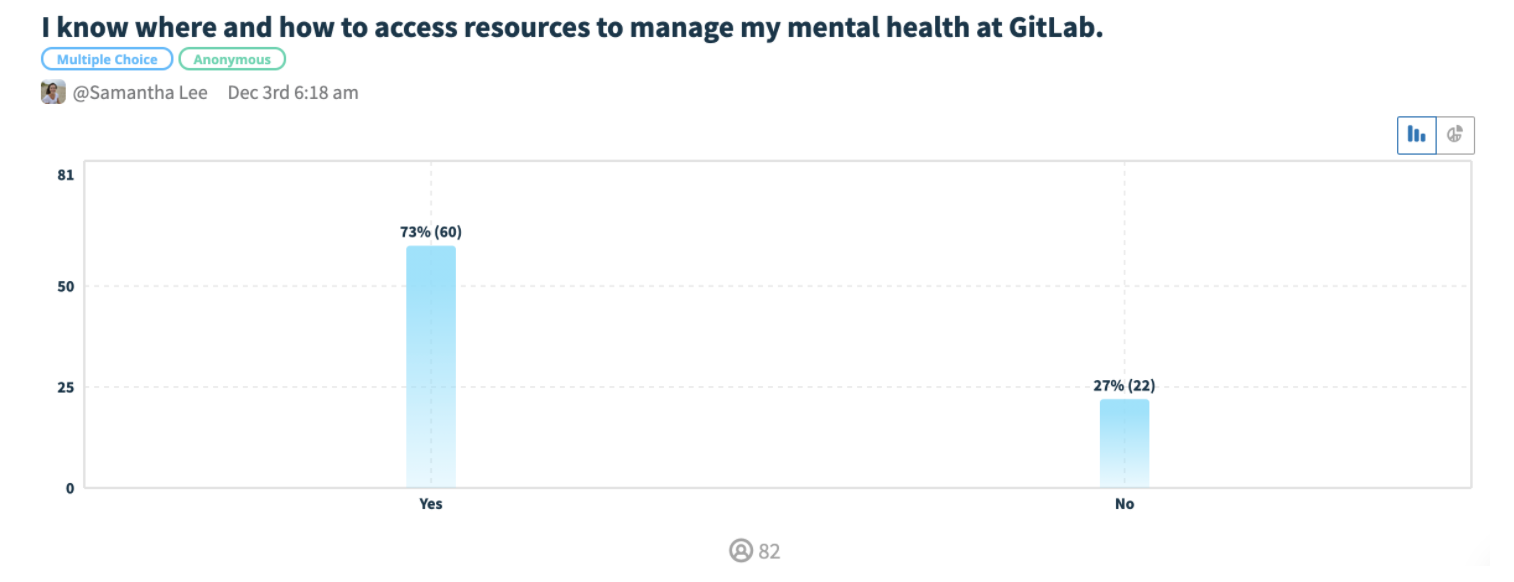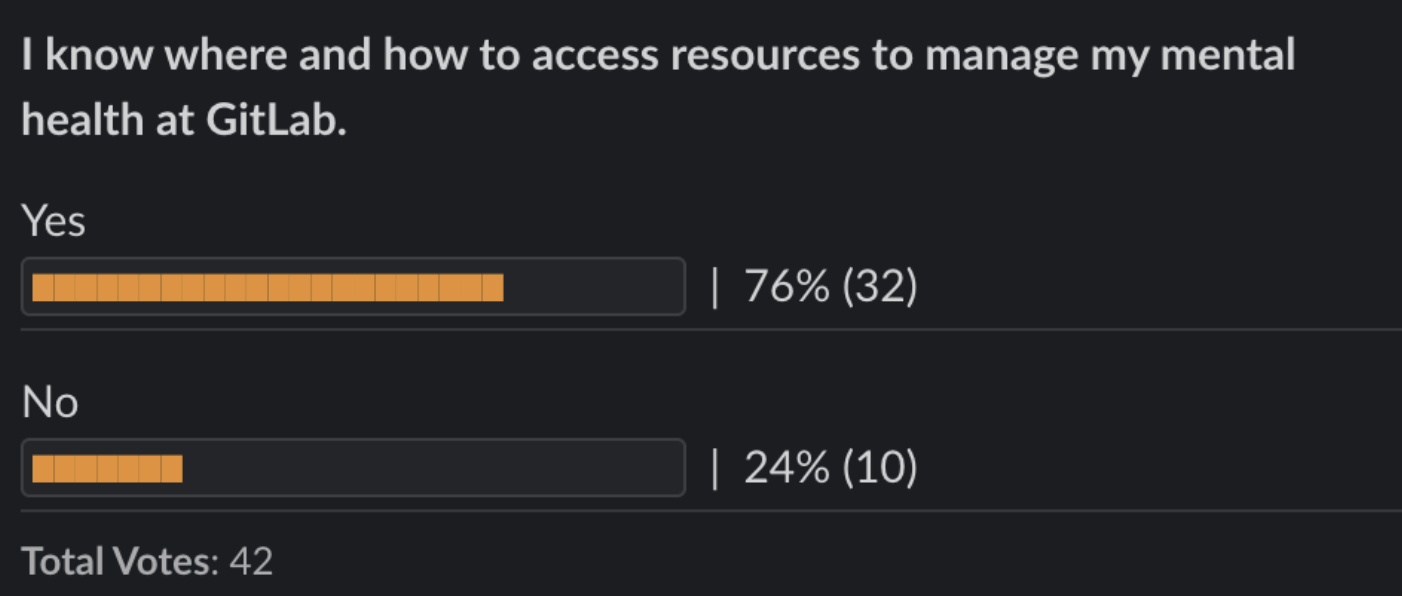As an all-remote company, the GitLab team is distributed across the globe. Our team is used to working online, scheduling Zoom social hours, and using asynchronous communication strategies.
Even with all these work from home skills in our back pockets, 2020 has been a challenge. Over the year, we've adapted to new work environments, taken on new roles within our families and communities, and found new and creative ways to connect from a distance. It's been chaotic and it has taken a toll on our mental health.
Over the last few months, the Learning and Development (L&D) team at GitLab heard team members express feelings of burnout. Personally, in coffee chats and slack conversations, I heard team members speak of feeling exhausted and overwhelmed. The combination of maintaining a regular work schedule, caring for family, and finding time to relax and recharge, all while living through a global pandemic, is taking its toll.
I could relate. I was feeling this overwhelm, too.
In response to these conversations, the L&D team launched an asynchronous internal learning campaign for the GitLab team with the goal of increasing awareness of, and access to, existing mental health resources at GitLab. This was a new learning initiative for the team, leveraging GitLab issues, Slack reminders, polls, and a learning speaker series to engage and educate team members.
Take a few minutes to read the rest of this post to learn about the intentions behind the initiative, major takeaways, and what we're doing moving forward to continue the conversation.
Why participate asynchronously?
Asynchronous communication gives team members the opportunity to work efficiently, collaborate, and put friends and family first.
When it comes to engaging learning content, applying asynchronous strategies can be challenging. Many learners are used to learning in collaborative, co-located groups or calls. The GitLab L&D team is always exploring and experimenting with new ways to make asynchronous learning just as engaging as synchronous learning. With this campaign, we used GitLab issues, Slack, the Polly app, and Zoom to deliver information and host discussion.
This awareness campaign needed to be designed with as many asynchronous elements as possible to
- Make content accessible and consumable for all team members, regardless of their time zone or location
- Avoid creating additional overwhelm for participants related to attending synchronous calls, and instead let team members review content on their own time
- Document content for future self-paced learning paths
In addition to making this awareness campaign asynchronous, all participation was optional. Discussing mental health and burnout can be challenging and uncomfortable. We wanted to allow space to discuss burnout only when team members felt comfortable and ready.
So, how'd it go!
A few great wins from the week:
First, we collaboratively stood up our mental health tool stack as part of our day 2 issue. Team members were asked to open an MR and contribute tools they use to manage burnout. Together we collected 12 resources. If you have one to add, please contribute!
Second, we created, tested, and documented a new learning initiative, internal learning campaigns!. The L&D team is exploring new ways to deliver bite-sized learning, and this is one we will try again in the future.
And finally, we hosted a fantastic live speaker series with John Fitch, author of the book Time Off. Team members asked questions about how to take meaningful time off, how to return from PTO, and how managers can encourage team members to take time off. Approximately 100 team members attended synchronously, and many watched the recorded replay.
A little more about John - he's the co-author of the international bestseller Time Off: A Practical Guide to Building Your Rest Ethic and Finding Success Without the Stress, a book that expands our value of time off, and how our rest and leisure are as important as our work. John is a recovering workaholic who wrote this book for a former version of himself. He cares deeply about the future of work and is optimistic that everyone has the opportunity to join the creative class in the near future. John is now building tools for helping people and teams design their rest ethic and manage their time off more effectively. He would love to hear from you if you are passionate about intentional time off.
Watch the replay of our live speaker series below!
What didn't go so well?
One of the goals for the week was to increase the number of team members who answered 'Yes' to the following question: 'I know where and how to access resources to manage my mental health at GitLab'. Based on the Polly polls we shared in our #what's-happening-at-GitLab Slack channel, we saw a 3% increase in the number of team members who answered 'Yes', increasing from 73% to 76%
Here are some screenshots of the poll data:
Our initial poll data, collecting information before the awareness week:

And our final poll data, collecting information after the awareness week:

While this shows a slight increase, it's not enough, and the L&D team recognizes we need to do more as a company to communicate this information more widely and empower team members to use the available resources. A few issues we noticed with this data collection:
- We aren't sure if the people who took the first poll also took the second poll since the poll is anonymous
- We also aren't sure if the people who took either poll particiapted in any or all of the awareness week content. Since participation was completion optional, we didn't track who decided to get involved
- Fewer people responded to the final poll than the initial poll
Now what?
The role of Learning & Development at GitLab has evolved during Covid-19 to include more support for mental health and wellbeing of our team members. Looking after team members wellness is no longer a passing priority. The increasing pace of monumental change and stress indicates otherwise. The pandemic is a marathon, not a sprint, and our role as learning leaders is equipping our team members with a set of tools to build resilience, manage through change, and take care of their mental health.
This internal awareness campaign was just the start of a series of learning opportunities the L&D team is creating for team members to explore their mental health and learn strategies for managing burnout. We're working on new mental health and burnout management inititiaves for 2021 to continue this conversation beyond this awareness campaign.
We're also working on creating a self-paced learning path through this awareness campaign content, so that team members who missed the content, future team members, and our wider community can review the material. Follow the updates from our new GitLab Learn platform to find out when this learning path will be available.
In the meantime, we encourage you to check out the content from the week shared via GitLab issues!
| Issue Link | Content |
|---|
